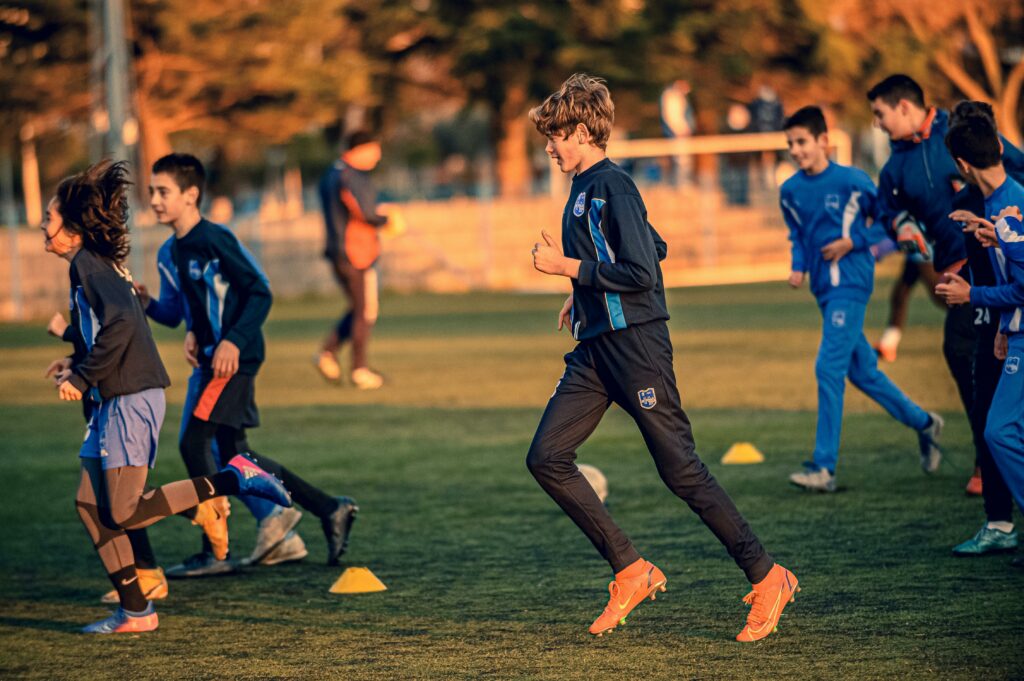Can we really train our brain to perform better in sports?
In this interview, we will dive into several techniques you can use to perform better thanks to the power of your brain. You will find some additional resources at the end of the article.
Young Athlete (YA): Can we really train our brain to perform better in sports?
Anne Delannet (AD): Absolutely! Just like we train our bodies to be stronger and faster, we can train our brains to help us perform better in sports. The mind and body are deeply connected, and by training our brain, we can improve our focus, confidence, and overall performance.
YA: How does that work exactly?
AD: It involves several techniques, but one of the most powerful is mental imagery or visualization. This means imagining yourself performing your sport perfectly in your mind, but also preparing yourself for different cases-scenario. For example, if you’re a football player, you might visualize yourself scoring a goal, focusing on every detail from the way you move to how the ball feels when you kick it. Studies have shown that this kind of mental practice can improve actual performance.
YA: Does that mean if I imagine myself being great, I will be?
AD: Visualization is a tool, not magic. It needs to be combined with physical practice. When you visualize, you’re training your brain to react in the best possible way. It builds mental pathways that can make your actions more automatic and precise. So, when you physically practice, these pathways help you perform those actions more efficiently.
YA: Are there other ways to train our brain?
AD: Yes, there are several techniques. Here are a few:
- Breathing techniques: These practices help you stay present and reduce stress, allowing you to focus better during competition.
- Positive Self-Talk: Encouraging yourself with empowering statements can boost your confidence and reduce anxiety.
- Goal Setting: Setting clear, achievable goals helps you stay motivated and gives you direction in your training.
- Functional Imagery Training: This is a more advanced form of visualization that involves using all your senses to imagine scenarios, which has been shown to be particularly effective.
YA: What’s Functional Imagery Training?
AD: Functional Imagery Training (FIT) is a technique that enhances your ability to create detailed mental images. It’s especially helpful for athletes who find it difficult to visualize. FIT involves exercises that engage multiple senses, not just sight. For instance, if you’re visualizing a basketball game, you’d imagine the sound of the ball bouncing, the feel of the court under your feet, and even the smell of the gym. This multisensory approach makes the imagery more vivid and effective.
YA: Can you give an example of how this has helped athletes?
AD: Certainly! There’s research showing that athletes who struggled with visualization improved significantly through FIT. This improvement translated to better performance because they gained mental clarity and precision. It’s like having a mental rehearsal before the actual event, which prepares you to perform at your best.
YA: How can I start using these techniques?
AD: You can start with simple visualization exercises. Spend a few minutes each day imagining yourself performing a specific skill or part of your sport perfectly. Combine this with regular physical practice. Additionally, practice mindfulness and positive self-talk. If you’re interested, you can also try more structured programs like FIT with the guidance of a coach or through resources designed for young athletes.
YA: Thank you! This sounds really helpful.
AD: You’re welcome! Remember, you can really train your brain for better perfromance in sports and also training your brain is just as important as training your body. With dedication and the right techniques, you can enhance your performance and enjoy your sport even more.
Reflections for Young Athletes:
- Practice Visualization Daily: Spend a few minutes each day visualizing success in your sport.
- Combine Mental and Physical Training: Use mental techniques alongside your regular training for best results.
- Stay Positive: Encourage yourself with positive self-talk and set clear, achievable goals.
- Explore Advanced Techniques: Consider learning more about Functional Imagery Training to enhance your mental practice.
Explore Further: if you are interested to enhance your kid’s mindset’s potential, check out here:
- Easy and age appropriate mental techniques: Mindset Notebook for young athletes
- Goal settings & routine: Goals Notebook for young athletes
- Analyzing performance to improve your game: Post Evaluation Match Notebook for young athletes

